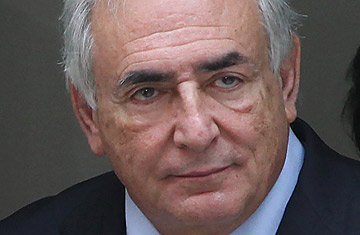
Former IMF chief Dominique Strauss-Kahn departs his temporary residence in the Tribeca neighborhood of New York City on July 6, 2011
(2 of 2)
The decision to end the case altogether comes after weeks during which the accuser and her attorneys tried to publicly pressure the prosecutors into continuing the case. On July 25, Diallo went forward in interviews with Newsweek and ABC News and told her side of the story of the alleged attack. Two weeks later, Diallo filed a civil suit in the Bronx, asking for unspecified monetary damages for what the complaint called a "violent and sadistic attack."
Yet on Aug. 19, Assistant District Attorney Artie McConnell sent a letter to Thompson, inviting Diallo to a meeting on Aug. 22. According to the letter, which was obtained by the New York Times, the purpose of the meeting was for McConnell to "[explain] to her what I anticipate will occur in Court on the following day" which Thompson said he interpreted to mean they would be dropping the case or altering the charges.
In an interesting twist, Thompson himself gave the letter to the Times after criticizing the Manhattan DA's office for press leaks in the complaint filed for the civil lawsuit. "There have been leaks to the news media of false information about Ms. Diallo, apparently by members of the Manhattan District Attorney's Office," the complaint states, "that have severely damaged Ms. Diallo's credibility, reputation and character."The civil suit ensured that Diallo's version of the story remained in the public eye; however, it may not have been the best legal move in her push for criminal prosecution. "If they have any hope for the prosecution going forward and resulting in a conviction, then it's a very foolish move," Bob Bennett, a leading criminal-defense attorney and former federal prosecutor who represented Bill Clinton against Paula Jones in her sexual-harassment suit, tells TIME. "This just confirms the theory of the defense that this is just all about money. What better evidence than the fact that she filed a suit for money?"
In particular, the timing of the civil suit before the criminal prosecution had ended appeared to be a hedge against the prospect that the case would be dropped. But by initiating the lawsuit weeks before the possible announcement that criminal charges would not proceed, Diallo's lawyers may have hurt their cause. "If it were dropped, you would have a perfect opportunity to stand up and say, 'She's not getting any justice in our criminal courts. We have no choice but to file civilly to try to get justice,' " Bennett says. "They can't make that statement now."
The lawsuit may also have been an attempt to keep Strauss-Kahn from returning to France, but it's unlikely that a civil suit would be enough to keep him in the States.
On July 1, prosecutors admitted that the case was weakened because of issues with Diallo's credibility. The motion to dismiss details instances in which the DA's office contends Diallo was not truthful. The papers describe three different versions of the incident, which the DA says Diallo provided at different times. The motion also explains falsehoods Diallo said to prosecutors, including that she had been raped in her native Guinea. In the end, the motion says, "The complainant's testimony at trial cannot be relied upon to establish proof beyond a reasonable doubt," although its first footnote explains that the motion "does not purport to make factual findings. Rather, we simply no longer have confidence beyond a reasonable doubt that the defendant is guilty."
